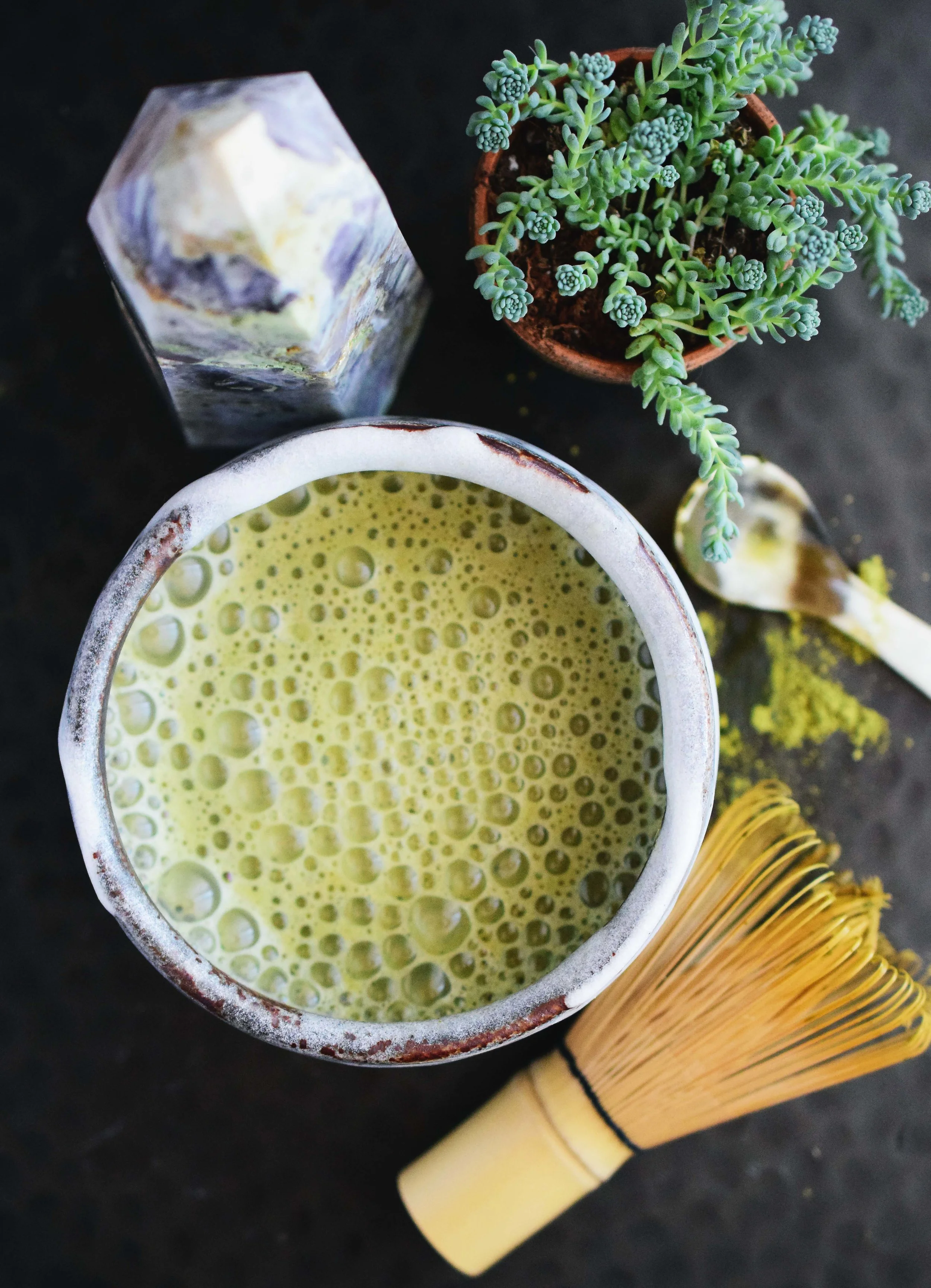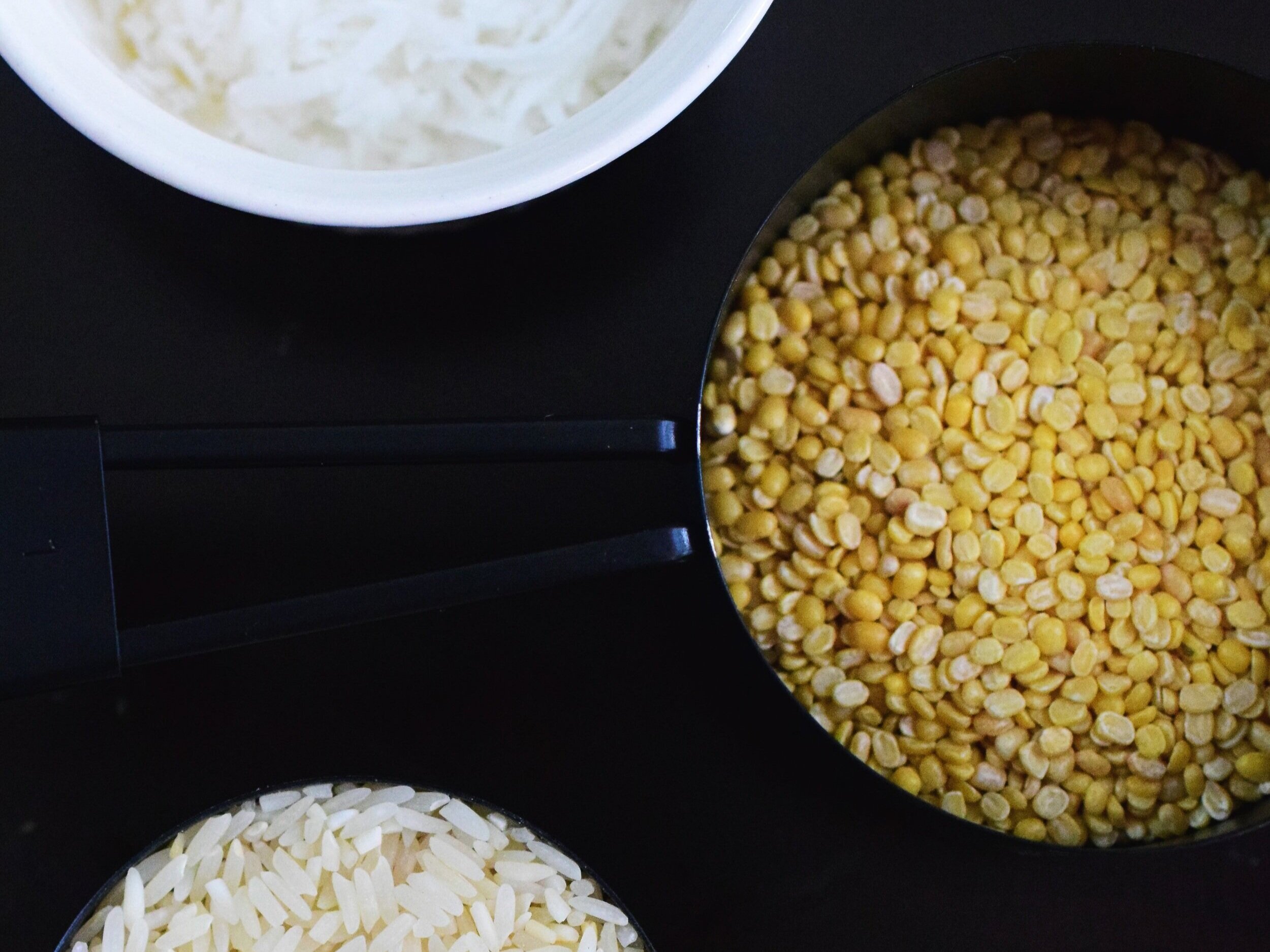Matcha (Japanese Green Tea) Latte
High in antioxidants, Matcha (Japanese Green Tea) offers many health benefits and makes a delicious latte.
Read on to hear about my first exposure to Matcha, dive into some science, and learn how to make a Matcha latte!
Matcha
Since ancient times green tea has been considered a health-promoting beverage. I first heard of Matcha, a Japanese Green Tea, in Saint Lucia. I was there for a friend's wedding, lounging in a pool overlooking the Pitons and enjoying life. Sometimes I learn the best info in the most unsuspecting places! One of the groomsmen enthusiastically shared with me the fantastic effects of Matcha and why he was inspired to be a part of the growing company, Meta Matcha. Part of this mission statement:
Our mission is to provide a beverage that unlocks the energy within, elevating us to a state of mental clarity and self-discovery.
Mental clarity and self-discovery? I am open to that. I had some other inspiration to try Matcha. I love coffee but not the secondary jitters! Learning that there was a coffee alternative that had a list of health benefits and could leave me free of jitters piqued my interest. Meta Matcha's website has a whole list of effects. See a few below.
Benefits for the Mind
“Matcha sharpens mental acuity and heightens the senses. The combination of energizing caffeine with calming L-Theanine promotes focus and clarity of thought, generating a sense of confidence and positivity. L-Theanine combats the ‘jitters’ and ‘crash’ typically associated with caffeine, allowing the mind to use energy more efficiently.”
Benefits for the Body
“Matcha’s abundant antioxidants speed up metabolism and work at the cellular level to scrub harmful free radicals. The antioxidant capacity of Matcha is five fold more than blueberries, cleansing toxins and rejuvenating cells.”
What does the science say???
The Times article, "Should You Drink Matcha Tea?", briefly dives into why matcha tea is so beneficial. We can attribute the benefits to a class of antioxidants called catechins. The antioxidant in this catechins class associated with so many health benefits is epigallocatechin gallate (EGCG). Studies have linked green tea (containing EGCG) to a variety of health benefits including preventing heart disease, type 2 diabetes, and cancer. Remember that correlation doesn't indicate causation! To my knowledge, more studies are needed to support that EGCG is the cause of disease prevention; however, there is still a lot of research out there supporting the claims! Here are three peer-reviewed articles that further support EGCG's benefits:
A 2017 article in BioMed Research International states, "Several studies support the notion that EGCG has several benefits in fighting cancer, heart diseases, diabetes, and obesity, among others."
A 2012 article in Nutrients speaks to how EGCG is not only a favorite drink consumed daily by millions of people around the world but is also the most effective chemopreventive polyphenol in green tea! Chemopreventive means either preventing or slowing down the development of cancer. How cool!
A 2007 article in the Journal of the American College of Nutrition truly caught my attention as a former Environmental Toxicologist. They call on the concept of dose-response relationships.
Dose-response relationships observed in several epidemiological studies have indicated that pronounced cardiovascular and metabolic health benefits can be obtained by regular consumption of 5-6 or more cups of green tea per day.
How to make a Matcha (Japanese Green Tea) Latte
I've included the recipe that I learned at Dobra Tea in Asheville. I've also added a video below from JUST ONE COOKBOOK. This video covers how to prepare Matcha tea while the article dives into multiple Matcha topics, including:
Matcha 101
What is Matcha?
What is the difference between Matcha and regular loose-leaf green tea?
How is Matcha made?
Why is Matcha good for your health?
Does Matcha contain caffeine?
How long does green tea powder last? How should I store Matcha?
3 Things You Need To Make Matcha
Chawan (Tea Bowl) * I have one of these!
Chasen (Tea Wisk) *I have one of these too!
Chashaku ('tea scoop')
2 Types of Matcha Green Tea
Thinner: Usucha
Thicker: Koicha
Matcha (Japanese Green Tea) Latte
| Kayla Lee Lander |
- Prep Time: 3 minutes
- Cook Time: 2 minutes
- Total Time: 5 minutes
Servings: Yields One Latte
Ingredients:
- 1/4 cup of water
- 1 teaspoon matcha powder
- 1 cup of milk [goat, coconut, or almond are great dairy-free option]
- 1-2 teaspoons of honey (more to taste)
Instructions:
- Pour boiling water into chawan (Japanese tea bowl) and let it cool down briefly.
- Gently add matcha powder to cooled water.
- Use a chasen (Japanese whisk) to combine matcha and hot water to form a paste.
- Add warmed milk of choice and continue to whisk the matcha mixture until small bubbles form.
- Add honey to taste and enjoy immediately
- Don’t forget to clean the chasen as well as rest it on its base for drying!









